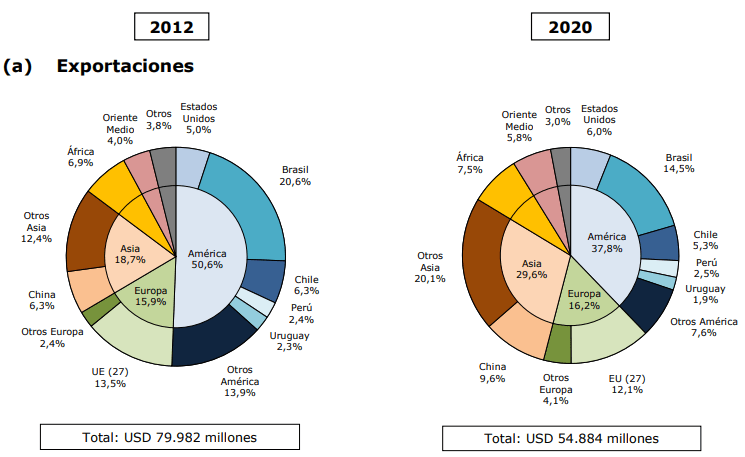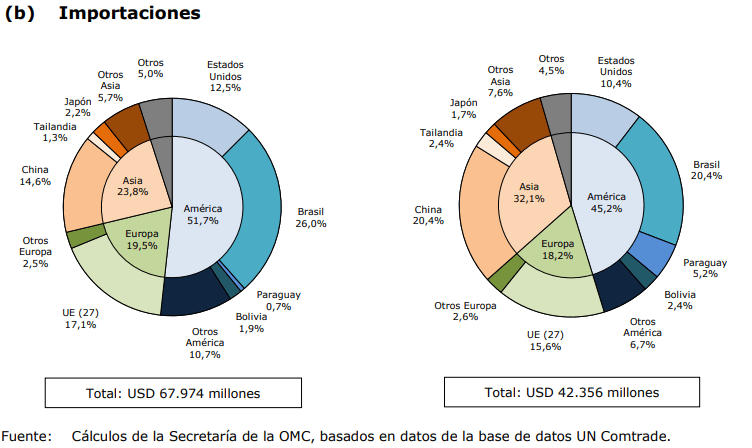Argentina’s trade policy undermines its effectiveness: WTO

Argentina’s trade policy follows certain measures that can undermine its effectiveness, indicates a report by the World Trade Organization (WTO).
One of the main objectives of Argentina’s trade policy is to increase its participation in international trade through the increase and diversification of exports, for which it seeks to integrate SMEs into export activity and international value chains , and promote social inclusion.
Trade policy
In its internationalization strategy, Argentina also considers that the role of women should take even more prominence, since gender equality is fundamental for development and growth.
Merchandise trade by trading partner, 2012 and 2020

Argentina continues to actively use trade policy measures as an instrument to achieve objectives in areas that sometimes go beyond trade.
This includes both long-term objectives (economic growth and development) and short-term objectives (higher tax collection, containment of inflation or maintenance of the balance of payments balance).
The frequent adjustments made to laws and regulations to achieve different objectives with trade policy instruments, although aimed at obtaining concrete results, may end up adding complexity to the trade regime, making it less predictable, and even reducing the effectiveness of certain policies.
For example, according to the WTO, although the promotion of exports is one of the main objectives of trade policy, and efforts are made to incentivize them through measures such as export refunds and other incentives, they resort to at the same time to the use of export duties to achieve collection objectives, which discourages exports.
Foreign trade
Currently, all Argentine exports are taxed with export duties, whose rates range from 0 to 33 percent.
During the period under review, the products subject to export duties, as well as the rates, have been modified on several occasions.
In 2021, WTO data indicates that 92.7% of tariff lines were subject to a rate below 5%.
Effects on trade
Export duties are an important source of tax revenue; the collection of export duties progressively increased, reaching a peak in 2019.
In 2020, the collection of export taxes decreased due to the reduction in rates and the volume exported due to the health crisis, and represented 13.5% of the SNPF’s tax revenues, 5.7% of the total collection, and 12.7% of the value total exports.
From the perspective of the WTO, as Argentina is an «important exporter» (with a share in total world exports of more than 5%) of certain cereals, oilseed seeds and cakes, and vegetable oils, the use of export duties, sometimes high (as for soybeans), it could affect to some extent the terms of trade of these products.
Agricultural sector
Argentina is an important exporter of products from the agricultural chain, which continued to represent the main export item, with 63.3% of the total in 2020.
Derived oils obtained from grains, soybeans, wheat, corn and beef constitute the main exported products.
The corresponding part of manufactures in total exports fell in the period under review, mainly due to the sharp drop in exports of products from the automobile industry and chemical products.
On the other hand, last year, 85% of imports were manufactured products.
The evolution of the composition of imports in the period examined shows an increase in the proportion of machinery and equipment and chemical products, and a sharp contraction in the import of vehicles and fuels.
The main markets for Argentine exports in 2020 were: Brazil (14.5% of the total), the European Union (12.2%), China (9.6%), the United States (6.0%) and Chile (5.3%).
At the same time, the main sources of imports were: Brazil (20.4% of the total), China (20.4%), the European Union (15.6%) and the United States (10.4%).
![]()

